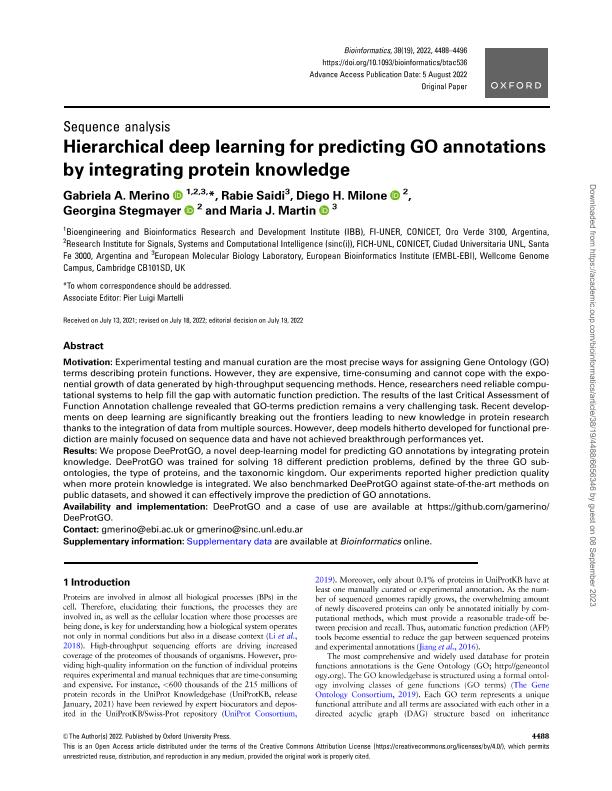Artículo
Hierarchical deep learning for predicting GO annotations by integrating protein knowledge
Merino, Gabriela Alejandra ; Saidi, Rabie; Milone, Diego Humberto
; Saidi, Rabie; Milone, Diego Humberto ; Stegmayer, Georgina
; Stegmayer, Georgina ; Martin, Maria J.
; Martin, Maria J.
 ; Saidi, Rabie; Milone, Diego Humberto
; Saidi, Rabie; Milone, Diego Humberto ; Stegmayer, Georgina
; Stegmayer, Georgina ; Martin, Maria J.
; Martin, Maria J.
Fecha de publicación:
08/2022
Editorial:
Oxford University Press
Revista:
Bioinformatics (Oxford, England)
ISSN:
1367-4803
Idioma:
Inglés
Tipo de recurso:
Artículo publicado
Clasificación temática:
Resumen
Motivation: Experimental testing and manual curation are the most precise ways for assigning Gene Ontology (GO) terms describing protein functions. However, they are expensive, time-consuming and cannot cope with the exponential growth of data generated by high-throughput sequencing methods. Hence, researchers need reliable computational systems to help fill the gap with automatic function prediction. The results of the last Critical Assessment of Function Annotation challenge revealed that GO-terms prediction remains a very challenging task. Recent developments on deep learning are significantly breaking out the frontiers leading to new knowledge in protein research thanks to the integration of data from multiple sources. However, deep models hitherto developed for functional prediction are mainly focused on sequence data and have not achieved breakthrough performances yet. Results: We propose DeeProtGO, a novel deep-learning model for predicting GO annotations by integrating protein knowledge. DeeProtGO was trained for solving 18 different prediction problems, defined by the three GO sub-ontologies, the type of proteins, and the taxonomic kingdom. Our experiments reported higher prediction quality when more protein knowledge is integrated. We also benchmarked DeeProtGO against state-of-the-art methods on public datasets, and showed it can effectively improve the prediction of GO annotations.
Archivos asociados
Licencia
Identificadores
Colecciones
Articulos(SINC(I))
Articulos de INST. DE INVESTIGACION EN SEÑALES, SISTEMAS E INTELIGENCIA COMPUTACIONAL
Articulos de INST. DE INVESTIGACION EN SEÑALES, SISTEMAS E INTELIGENCIA COMPUTACIONAL
Citación
Merino, Gabriela Alejandra; Saidi, Rabie; Milone, Diego Humberto; Stegmayer, Georgina; Martin, Maria J.; Hierarchical deep learning for predicting GO annotations by integrating protein knowledge; Oxford University Press; Bioinformatics (Oxford, England); 38; 19; 8-2022; 4488-4496
Compartir
Altmétricas



